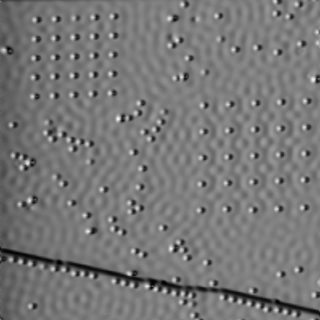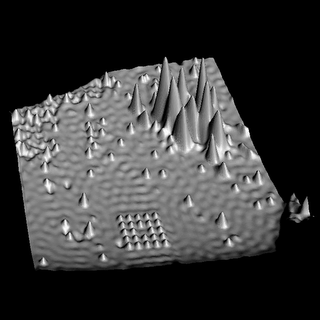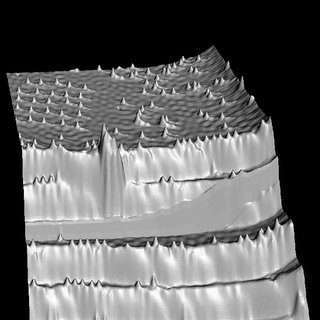I'm not doing very well on my monthly goals, but at least I'm making progress. One of my major projects was to organize my electronic files. I finally finished doing that over Thanksgiving break. The task was horribly tedious, but it's refreshing to browse my hard drive and see everything neatly sorted into folders and given appropriate file names. The new organization scheme is a little bit layered, but I can always use Copernic Desktop Search.
It's time for some new goals. Stay tuned for a further post.
27 November 2006
Tech: Zoom H4 digital recorder
The Edirol R-09 now has a competitor: the Zoom H4. They are similar products apparently, but the Zoom H4 has more features and costs $100 less. The downside to the Zoom H4 (according to Amazon reviews) is that it has a much more complicated user-interface.
19 November 2006
Quote of the day: Battlestar Galactica, Episode "Hero"
Tigh: Tell you a dirty little secret: The toughest part of getting played is losing your dignity. Feeling like you are not worth the oxygen you are sucking down. You get used to it. You start to believe it. You start to love it. It's like a bottle that never runs dry. You can keep reaching for it over and over and over again.
Adama: So how do you put that bottle away, Saul?
Tigh: I don't know. One day you just decide to get up and walk out of your room.
13 November 2006
The purpose of a clean desk
I listened to one of the recent 43Folders conversations with David Allen (can't remember which one). Merlin Mann noted, during one of his conversations, that David Allen always has a clean desk and only the materials relevant to the task on hand on his desk. I think that's a good idea. It reinforces one of the principles of GTD which is to concentrate on one task and only that one task at a time. I will try to keep my desk clean more often.
Link of the day: My outsourced life
I found this amusing Esquire article via Ramit Sethi's blog. I can't tell how much of it is fact and how much is fiction.
07 November 2006
pdftex versus latex
I'm still trying to figure out whether one should use pdftex or latex when compiling .tex source files.
It seems like there are a few advantages to using pdftex over latex. 1) It's faster, 2) Leaves behind fewer junk files (like .dvi and .aux) and lets you go directly to .pdf which is a more modern file format than .ps, 3) Apparently it works better with the hyperref package (hyperlinks inside the .pdf document), 4) The .pdf generated by pdftex is guaranteed to look great whereas you might get an ugly .pdf if you use the command ps2pdf on your .ps output file from latex. The only advantage of latex over pdftex is that there are some packages which are incompatible with pdftex, most notably psfrag.
A short discussion can be found near the bottom of this blog post.
It seems like there are a few advantages to using pdftex over latex. 1) It's faster, 2) Leaves behind fewer junk files (like .dvi and .aux) and lets you go directly to .pdf which is a more modern file format than .ps, 3) Apparently it works better with the hyperref package (hyperlinks inside the .pdf document), 4) The .pdf generated by pdftex is guaranteed to look great whereas you might get an ugly .pdf if you use the command ps2pdf on your .ps output file from latex. The only advantage of latex over pdftex is that there are some packages which are incompatible with pdftex, most notably psfrag.
A short discussion can be found near the bottom of this blog post.
Link of the day: Ode to the afternoon nap
I always wonder if it's a good idea to take naps. Here's a discussion on Lifehacker about taking naps.
For me, it's important that I take a nap because I'm really tired and not because I'm avoiding work. In the former case, I really do find it beneficial.
For me, it's important that I take a nap because I'm really tired and not because I'm avoiding work. In the former case, I really do find it beneficial.
06 November 2006
STM images of Co atoms on a Cu (111) surface
During my great file cleanup, I found some scanning tunneling microscope (STM) images I took during a summer research project about five years ago.
I used the STM to arrange cobalt atoms in the pattern of square lattices on a copper (111) surface. They weren't exactly square since the the sites on the copper (111) surface are arranged in a hexagonal lattice. I also used the STM to image the surface. The STM current is kept constant with a feedback loop and the instrument measures the height of the STM at each point on the surface. By scanning the STM over the entire surface, you get a topographic map of the surface.
Here's a square lattice. The image is a 2D grayscale plot with a light source.

This image is a 3D plot of the STM height with a light source. If you "crash" the STM tip into the surface, you get the "mountain" like features shown in this picture. Sometimes you crash the tip into the surface on purpose in the hope of getting a sharper tip.

The copper surface isn't flat. There are places where the surface is sheared off to a lower atomic layer, resulting in "terraces." You can see a square lattice (the little bumps) on the top lefthand side of the image (also a 3D plot).

I used the STM to arrange cobalt atoms in the pattern of square lattices on a copper (111) surface. They weren't exactly square since the the sites on the copper (111) surface are arranged in a hexagonal lattice. I also used the STM to image the surface. The STM current is kept constant with a feedback loop and the instrument measures the height of the STM at each point on the surface. By scanning the STM over the entire surface, you get a topographic map of the surface.
Here's a square lattice. The image is a 2D grayscale plot with a light source.

This image is a 3D plot of the STM height with a light source. If you "crash" the STM tip into the surface, you get the "mountain" like features shown in this picture. Sometimes you crash the tip into the surface on purpose in the hope of getting a sharper tip.

The copper surface isn't flat. There are places where the surface is sheared off to a lower atomic layer, resulting in "terraces." You can see a square lattice (the little bumps) on the top lefthand side of the image (also a 3D plot).

04 November 2006
Physics and philosophy
I had a nice discussion last night at dinner with a philosophy graduate student. I mentioned that condensed matter physics deals with finding emergent phenomena in complex systems. The philosophy grad student lit up and told me that "emergent phenomena" are also a hot topic in philosophy. Apparently, some philosophers think that values are an emergent phenomenon. Then we debated a bit about whether values are "objective" (an absolute truth like numbers) or "subjective" (dependent on the viewer's opinion).
Personally, I think the categories of objective and subjective are too narrow. There should be some kind of in-between category which values would fall under. I don't think there are any absolute values. There is always an exception to a rule. For example, one of the ten commandments is "thou shalt not kill." But what if I'm being attacked with no provocation? Of course, as C.S. Lewis would say (see his book Mere Christianity), it seems like there are some guiding moral principles that most people can agree on. So values are not subjective either.
My roommate was really interested in how to psychologically deal with the idea that we might all be "brains in a vat." The philosophy graduate student made two good points. First, the question of being a brain in a vat is by definition unknowable. So it seems silly to worry about it. Second, reality should be taken in context. Maybe we are living in a Matrix-like environment and our bodies are plugged into a computer. But that doesn't make our perceptions false. In the context that we perceive, our hands are real, the table when I tap it is real. The idea of context is very natural to a physicist. I don't go around telling people that quantum mechanics is true (in the absolute sense). But when we study phenomena on the scale of atoms, then quantum mechanics is the appropriate lenses to understand these phenomena.
I have mixed feelings about philosophy. On the surface, it seems like a fascinating topic. But at the end of the day, when you twist and turn your brain, you don't feel like you've learned anything. I think philosophy focuses too much on finding absolute truth and thus sometimes gets sidetracked from the practical matters of living -- which is the reason why I'm interested in philosophy in the first place.
Personally, I think the categories of objective and subjective are too narrow. There should be some kind of in-between category which values would fall under. I don't think there are any absolute values. There is always an exception to a rule. For example, one of the ten commandments is "thou shalt not kill." But what if I'm being attacked with no provocation? Of course, as C.S. Lewis would say (see his book Mere Christianity), it seems like there are some guiding moral principles that most people can agree on. So values are not subjective either.
My roommate was really interested in how to psychologically deal with the idea that we might all be "brains in a vat." The philosophy graduate student made two good points. First, the question of being a brain in a vat is by definition unknowable. So it seems silly to worry about it. Second, reality should be taken in context. Maybe we are living in a Matrix-like environment and our bodies are plugged into a computer. But that doesn't make our perceptions false. In the context that we perceive, our hands are real, the table when I tap it is real. The idea of context is very natural to a physicist. I don't go around telling people that quantum mechanics is true (in the absolute sense). But when we study phenomena on the scale of atoms, then quantum mechanics is the appropriate lenses to understand these phenomena.
I have mixed feelings about philosophy. On the surface, it seems like a fascinating topic. But at the end of the day, when you twist and turn your brain, you don't feel like you've learned anything. I think philosophy focuses too much on finding absolute truth and thus sometimes gets sidetracked from the practical matters of living -- which is the reason why I'm interested in philosophy in the first place.
03 November 2006
The great file cleanup
Back in late August, one of my stated goals was to "organize electronic files."
I'm at least halfway through cleaning up all the files on my hard drive now; all the non-physics stuff has been organized. During this process, I have been thinking about a good file naming convention. There were some suggestions I found on a previous post.
For articles, I try to use the convention author_name-article_title-publication_name-year. If the title is vague or unhelpful, I'll rename it. I prefer using dashes as opposed to underscores because they are easier to read and because they are easier to type (no shift key).
I also tend to create a lot of folders. The folder names can be quite descriptive and serve as a poor alternative to tagging. I'm trying a nested file directory structure. For instance, I use a small number of super-folders called "culture", "work", "computing", "lifehacking", etc. Each of these super-folders contains more directories.
Folders and long file names seem a bit archaic and tedious, but at least you can count on them being robust and dependable for years to come. Also, they are OS-independent which is nice if you use more than one OS.
I'm at least halfway through cleaning up all the files on my hard drive now; all the non-physics stuff has been organized. During this process, I have been thinking about a good file naming convention. There were some suggestions I found on a previous post.
For articles, I try to use the convention author_name-article_title-publication_name-year. If the title is vague or unhelpful, I'll rename it. I prefer using dashes as opposed to underscores because they are easier to read and because they are easier to type (no shift key).
I also tend to create a lot of folders. The folder names can be quite descriptive and serve as a poor alternative to tagging. I'm trying a nested file directory structure. For instance, I use a small number of super-folders called "culture", "work", "computing", "lifehacking", etc. Each of these super-folders contains more directories.
Folders and long file names seem a bit archaic and tedious, but at least you can count on them being robust and dependable for years to come. Also, they are OS-independent which is nice if you use more than one OS.
01 November 2006
NHL Google Video
At long last, you can watch NHL games on the internet via Google Video! The NHL posted this press release on their webpage today.
Rebooting
Sometimes it's difficult to resist comparing human beings to computers. A friend of mine who read my last post noted that as we get older, we accumulate more memories and that can cause us to crash like an old Windows installation.
That's why when I have a bad day, I like to take the night off, go to bed early, wake up at 6 am the next morning and go to the gym. It helps me get a fresh start again. I call this process "rebooting."
That's why when I have a bad day, I like to take the night off, go to bed early, wake up at 6 am the next morning and go to the gym. It helps me get a fresh start again. I call this process "rebooting."
Subscribe to:
Comments (Atom)